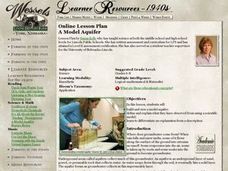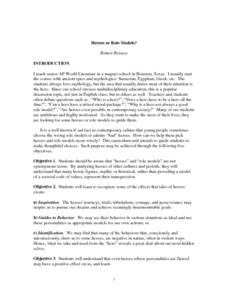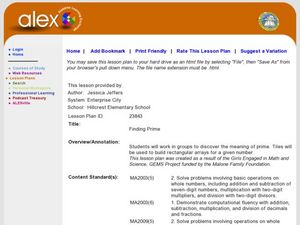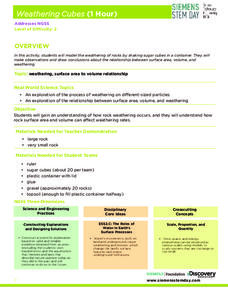Curated OER
Floodplain Modeling
Students simulate the impact of fluctuating river volumes on structures and landforms. They experiment with table top-sized riverbed models and water. Students consider how human design can help mitigate the effects of a flood.
Curated OER
Surface Area of a Leaf (Grades 7-9)
In this math and science activity, students read about the process of photosynthesis and plant growth. They determine how a plant's ability to create food is dependent on the surface area of its leaves using geometric calculations. They...
Curated OER
A Model Aquifer
Young scholars build a model that depicts how water is stored in an aquifer. They examine ways in which groundwater can become contaminated.
Curated OER
Modeling Hot and Cold Planets
Students, in teams, design and construct models of two planets, one hot and the other cold, using a variety of materials. They attempt to create the models out of substances that will actually show the greatest temperature differences...
Curated OER
Modeling Mitosis and Meiosis
Students construct and manipulate models of mitosis and meiosis and compare/contrast them. They create the models using index cards and yarn, interpret diagrams and photographs, and summarize written descriptions.
Curated OER
Heroes Or Role Models?
Students recognize that "heroes" and "role models" are not synonymous terms. By analyzing heroes of other cultures and periods, they determine that many heroic figures, mythic or historical, rather than providing a model of a societal...
Curated OER
Exploring Area and Perimeter
Two students are blindfolded and each receives a cardboard square, one with pompoms glued around the edge and one with pompoms glued all over the surface. They identify what they feel. The class discusses perimeter and area of polygons....
Curated OER
Introducing Powers and Models
Students construct two dimensional models to illustrate squared numbers. In this geometry lesson, students use graph paper and an x/y axis to build squares exponentially. Students identify powers and relationships between various figures...
Curated OER
Modeling a Soil Profile
In this soil profile worksheet, students use a cup to create the layers of soil using clay, sand, gravel and dirt. Students label each component as either A, B, or C horizon and the bedrock. They answer questions about their model.
Illustrative Mathematics
Comparing Products
How can 5th graders show understanding that 30 x 225 is half of 60 x 225 without completing the computation? They can use an area model and draw it out. An array, or an open array, is an area model that allows for young learners to...
EngageNY
Reading and Taking Notes on Colonial Trades
In the tenth instructional activity of this unit, young scholars learn to categorize information as they continue researching their colonial trade. During guided practice, the teacher models how to read informational text slowly while...
Alabama Learning Exchange
Finding Prime
Fifth and sixth graders explore prime numbers. They work with a partner to build rectangular arrays using twelve tiles. Factor pairs are noted and recorded on graph paper. Pupils construct rectangular arrays with a prime number and...
King Country
Lesson 2: Private & Public
What is the difference between a private and a public place? The focus in this second instructional activity on family life and sexual health is building an understanding of the difference between the concepts of private and public and...
Curated OER
Finding Fractional Parts Using an Area Model
Students explore math functions by completing a problem solving worksheet in class. For this division lesson, students utilize visual aides such as marshmallows and candy to visualize the act of division. Students complete a division...
Curated OER
Investigation: Area of Geometric Shapes
Fourth graders explore geometry by utilizing pattern blocks. In this pattern lesson, 4th graders analyze two separate pattern block shapes and discuss which one is bigger and smaller. Students collaborate in small groups to create...
Curated OER
Surface Area and Volume of a Cube
Young scholars explore finding the surface area and volume of cubes and cylinders. They construct similar three-dimensional figures from a two-dimensional drawing. Students derive the formula for volume and surface area through...
Curated OER
Cube Models
Sixth graders are introduced to the concepts of area and volume. In groups, they work together to build models of square centimeters in which they are given no instructions. To end the lesson, they record the dimensions of each model...
Balanced Assessment
L to Scale
Explore the meaning of scale in relation to actual size through this activity. Young mathematicians examine scale models and determine their relationship to each other. They also find perimeter and area of each model.
Teach Engineering
Air Pollution in the Pacific Northwest
Scholars investigate levels of nitrogen dioxide in the Pacific Northwest by examining the role of nitrogen in air pollution and how remote sensing can be used to measure nitrogen levels. An Excel spreadsheet calculates the difference...
Teach Engineering
Weather Alert
Every time a bell rings ... there is lightning in the area. The activity provides directions to build a model of a lightning detection system. Similar to a system designed by Benjamin Franklin, the system uses static electricity to...
Discovery Education
Weathering Cubes
Weathering is not necessarily a result of the weather. Scholars conduct an experiment to explore the effect of surface area and volume on the weathering process. They create their own sugar cube rocks using the same number of cubes—but...
John Wiley & Sons
Build a Pyramid
Learners discover fascinating facts about the Great Pyramid of ancient Egypt and construct a scale model of the pyramid with this fun activity instructional activity.
EngageNY
TASC Transition Curriculum: Workshop 8
Lights, camera, action! Math educators consider how to improve their instruction by examining a model of the five-practice problem-solving model involving a movie theater. Participants examine cognitive demand in relation to problem...
Curated OER
The Very Busy Spider
Youngsters explore visual arts by participating in a geometry identification activity. They read the book The Very Busy Spider and identify the techniques spiders use to create webs. Have you ever noticed that their webs are geometric...
Other popular searches
- Area Model Multiplication
- Fractions Using Area Models
- Probability Area Models
- Multiplication Area Models
- Arrays and Area Models
- Binomial Area Models
- Area Model Fractions
- Area Models and Distribution
- Area Model of Multiplication
- Modelling Local Area
- Area Models Presents
- Mixed Numbers Area Model

























